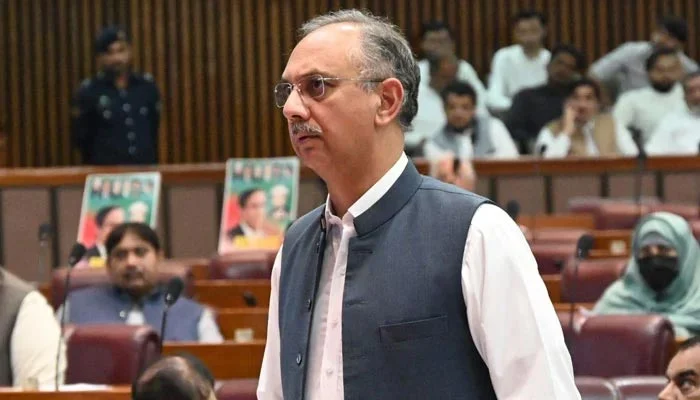Omar Ayub
Amidst ongoing political unrest in Balochistan, highlighted by the recent August 26 terror attacks and the resignation of veteran lawmaker Sardar Akhtar Mengal, Omar Ayub, the leader of the Opposition in the National Assembly, has made a significant statement regarding the patriotism of the people of Balochistan.
During a session in the lower house of parliament on Wednesday, Ayub, who is also the secretary-general of the Pakistan Tehreek-e-Insaf (PTI), characterized the people of Balochistan as being “more patriotic” than others in the country.
Ayub’s remarks came in the context of a turbulent period for Balochistan, following the resignation of Akhtar Mengal from the National Assembly.
Mengal, the chief of the Balochistan National Party (BNP-M), announced his resignation on August 28, citing the deteriorating conditions in his province and expressing a lack of confidence in the state, the president, and the prime minister.
Mengal’s resignation was a protest against what he described as the worsening situation in Balochistan, where he felt that the issues faced by the province had been consistently ignored.
In his speech, Ayub emphasized the need for serious attention to Mengal’s resignation and called for the formation of a fact-finding mission to assess the situation in Balochistan.
He suggested that a dedicated committee should be established to engage with the people of the province to address their grievances.
Ayub criticized the Balochistan government, claiming that its ministers were unable to communicate effectively with the populace and that the youth in the province were disillusioned with the government.
The PTI leader also raised concerns about the federal government’s reluctance to address the issues in Balochistan, implying that there was a broader lack of interest in resolving the province’s problems.
Ayub’s comments reflect a broader dissatisfaction with the handling of Balochistan’s issues and a belief that the federal government has failed to adequately engage with and address the province’s needs.
Meanwhile, Jamiat Ulema-e-Islam-Fazl (JUI-F) chief Maulana Fazlur Rehman also addressed the National Assembly, criticizing the government’s failure to maintain order in Balochistan and Khyber Pakhtunkhwa (KP).
Rehman pointed to the presence of armed groups equipped with advanced weaponry and called for immediate action to restore stability in these provinces.
He emphasized the need for experienced political leadership to address these challenges, rather than relying on inexperienced individuals.
Rehman also noted that geopolitical factors, including the involvement of major powers and security concerns impacting significant projects like the China-Pakistan Economic Corridor (CPEC), were complicating the situation further.
The turmoil in Balochistan was exacerbated by a series of deadly attacks on August 26, which resulted in over 50 fatalities, including 14 security personnel.
Militants affiliated with the banned Balochistan Liberation Army (BLA) targeted civilians, police, and security forces in these attacks. Among the incidents was a particularly brutal attack where 23 passengers were killed after being forcibly removed from buses and trucks in the Rarasham area of Musakhel.
Additionally, ten people, including police and Levies personnel, were killed in a gun attack in Kalat, and at least 14 members of the security forces and law enforcement agencies were martyred during clearance operations against militants.
The situation in Balochistan continues to be a focal point of national concern, with both political leaders and the public calling for effective measures to address the ongoing conflict and instability in the region.
I am a dynamic professional, specializing in Peace and Conflict Studies, Conflict Management and Resolution, and International Relations. My expertise is particularly focused on South Asian Conflicts and the intricacies of the Indian Ocean and Asia Pacific Politics. With my skills as a Content Writer, I serve as a bridge between academia and the public, translating complex global issues into accessible narratives. My passion for fostering understanding and cooperation on the national and international stage drives me to make meaningful contributions to peace and global discourse.










